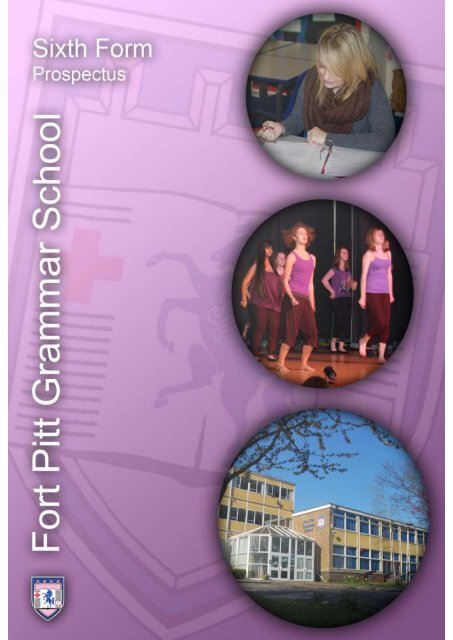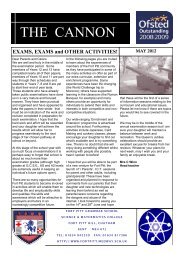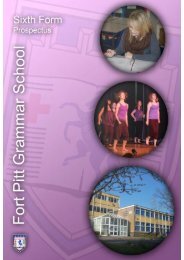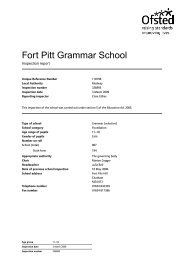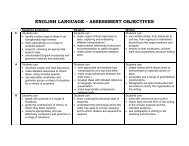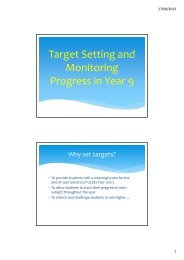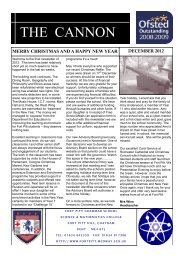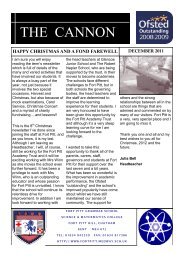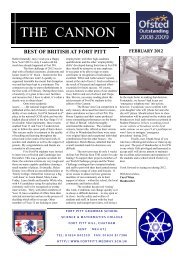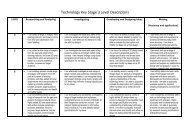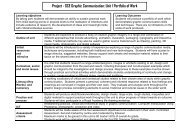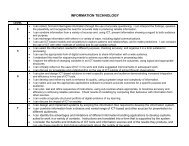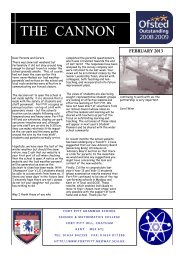Welcome to FPGS Sixth Form - Fort Pitt Grammar School
Welcome to FPGS Sixth Form - Fort Pitt Grammar School
Welcome to FPGS Sixth Form - Fort Pitt Grammar School
You also want an ePaper? Increase the reach of your titles
YUMPU automatically turns print PDFs into web optimized ePapers that Google loves.
The Transition <strong>to</strong> <strong>Sixth</strong> <strong>Form</strong> LifeThe move from Year 11 <strong>to</strong> the <strong>Sixth</strong> <strong>Form</strong> is a very significant one. Many changes face studentsas they move in<strong>to</strong> this different phase of life. Support will be needed and is always available <strong>to</strong>our students. Students are actively encouraged <strong>to</strong> study hard and aim for their personal bestacademically. Increasingly young people are expected by universities and future employers <strong>to</strong>demonstrate that they have developed skills beyond the academic and it is right that this is so.For the individual a great deal of satisfaction can be derived from becoming involved in activitiesother than the academic.At <strong>Fort</strong> <strong>Pitt</strong> it is our aim <strong>to</strong> provide well for both these areas.How Is <strong>Sixth</strong> <strong>Form</strong> Life Different From Year 11?In many ways, some of which are listed below:You will study fewer subjects.The depth of study will be greater.Greater emphasis will be placed on independent learning.You will have non-timetabled periods for private study.The management of time will become even more critical.You will have access <strong>to</strong> private study rooms and a common room.You will be taught in mixed aged and stage teaching groups – preparing for „real-life‟situations when you will work with people from a range of ages.A wide range of opportunities of an extra-curricular nature will be on offer from which youwill be encouraged <strong>to</strong> choose in order <strong>to</strong> make <strong>Sixth</strong> <strong>Form</strong> life more interesting andrewarding. These activities will also benefit you greatly when you come <strong>to</strong> seek universityplaces and employment.What Extra-Curricular Activities Are Available?The range of activities available at <strong>Fort</strong> <strong>Pitt</strong> is great, is developing and will continue <strong>to</strong> doso. They include Youth Parliament, Debating Society, contributing <strong>to</strong> the schoolnewspaper, sporting activities, music opportunities and our elected <strong>Sixth</strong> <strong>Form</strong>Management Team enjoy the benefits of professional training.
What Responsibilities Are Available To Students In The<strong>Sixth</strong> <strong>Form</strong>?At <strong>Fort</strong> <strong>Pitt</strong> it is felt <strong>to</strong> be very important that students reach their full potential in all ways and soopportunities <strong>to</strong> take on responsibilities are provided.Amongst these appointments are:Head Student / House LeaderDeputy Head Student / House LeaderA team of 20 students comprising 4 HeadStudents / House Leaders and 5 DeputyHead Students / House Leaders per House,make up the sixth form management team.And appointments <strong>to</strong> the:Charity Committee<strong>Sixth</strong> <strong>Form</strong> Committee<strong>School</strong> CouncilPeer Men<strong>to</strong>r TeamAs well as every department e.g. Geography and sub-departments e.g. Biology, Physics andChemistry appointing 2 subject prefects <strong>to</strong> support the teaching and learning and extra-curricularactivities within the department.All sixth formers are role models for the younger pupils so your appearance and conduct arecrucial. Please remember that you are part of the student management team of the school andbe expected <strong>to</strong> act accordingly.
AS and A Level points system used by UCASUCAS points value for each gradeA* A B C D EAS Yr 12 60 50 40 30 20A2 (AS + Yr 13) 140 120 100 80 60 40The best grade for Pre U GPR (D1) will be worth in excess of 140 points.Do all universities use the points system?Many universities continue <strong>to</strong> make offers based on grades.Most expect a student <strong>to</strong> have taken at least 4 AS subjects in Year 12, but the points willbe based on a minimum of 3 subjects at A2, and occasionally 4 subjects.The number of points needed varies according <strong>to</strong> the university and the course.It is possible at some universities, for example, <strong>to</strong> gain a place on an engineering coursewith DDE grades, whilst for Law, most universities require at least ABB and higher.Universities and courses that are popular will ask for higher points or higher grades.The higher your points <strong>to</strong>tal, the wider your choice of institutions and courses.Do ask me or Mrs Hargreaves, if you have any queries.
Dress code<strong>Sixth</strong> <strong>Form</strong> students are very much the leaders in school – they are seen by younger pupils asrole models, and are involved in Lower <strong>School</strong> activities and public events. We therefore askstudents <strong>to</strong> dress smartly. There is a distinctive <strong>Sixth</strong> <strong>Form</strong> dress code, details of which areoutlined below.Students are required <strong>to</strong> wear a standard office suit of either skirt, dress or trousers and atailored jacket in either black, dark brown, dark grey or dark blue (pinstripes are fine) and a <strong>to</strong>p oftheir own choice suitable for the work place, i.e. a <strong>to</strong>p with sleeves which is not overtly revealing.Overcoats should only be worn <strong>to</strong> and from school.Tights – please no leggings or footless tights.Shoes - Shoes should be leather type and in a smart, practical style. Dark colours please. (Notrainers, Dr. Marten-type boots, flip-flops or plimsoll/canvas shoes such as “Rocket Dogs”).Jewellery is acceptable in moderation. However, no facial, mouth or body piercings are allowed.Hair must be of a natural colour only.The main thing is <strong>to</strong> look smart and confident so that you can be a positive role model foryounger students in the school and present a professional impression <strong>to</strong> visi<strong>to</strong>rs. The supportyou give staff and other students makes a huge difference <strong>to</strong> the school – thank you in advance!
ContentsArt & Design (Fine Art)...................................................................................................... 3Art & Design (Graphic Design) ......................................................................................... 4Art and Design (Textiles) .................................................................................................. 6Business Studies .............................................................................................................. 7Economics ........................................................................................................................ 8English Literature .............................................................................................................. 9Film Studies .................................................................................................................... 11Geography ...................................................................................................................... 12His<strong>to</strong>ry ............................................................................................................................ 13Government and Politics................................................................................................. 14Information and Communication Technology ................................................................. 15French ............................................................................................................................ 16German........................................................................................................................... 16Spanish........................................................................................................................... 17Mathematics ................................................................................................................... 18Further Mathematics ....................................................................................................... 19Music .............................................................................................................................. 20Philosophy of Religion and Ethics .................................................................................. 22Physical Education ......................................................................................................... 23Psychology ..................................................................................................................... 24Applied Science .............................................................................................................. 25Biology ............................................................................................................................ 26Chemistry ....................................................................................................................... 27Physics ........................................................................................................................... 28Sociology ........................................................................................................................ 29Global Perspectives and Research (GPR) ..................................................................... 302
Art & Design (Fine Art)Exam Board:EDEXCELWhy study FINE ART?If you want <strong>to</strong> pursue practical art beyond GCSE – possibly further, and want <strong>to</strong> keepyour options open, then Fine Art is the perfect choice. Fine Art develops creativity,practical skills and aesthetic judgement without being tied <strong>to</strong> a particular specialism.During the course you will pursue all the traditional areas in Fine Art including drawingand painting, printmaking and sculpture. You will experience working with a wide rangeof materials from oil paints <strong>to</strong> digital imagery. We seek <strong>to</strong> find your strengths andenthusiasms and <strong>to</strong> build on these. Activities will include an introduction <strong>to</strong> life drawing,gallery visits, projects inspired by the local environment, three-dimensional challengesand culminate in you setting up your own A level exhibition with fellow students. Tosucceed on the course you will need <strong>to</strong> be a very enthusiastic crea<strong>to</strong>r of art work, who isprepared <strong>to</strong> work hard but for whom art does not seem like work. An inquisitive mindthat likes <strong>to</strong> find out about the concepts and contexts behind works of art is alsoimportant at this level of study. A GCSE in any field of Art and Design is also aprerequisite.Which other subjects complement it?Any of the Humanities, especially His<strong>to</strong>ry. Also, the creative and expressive subjectse.g. Music, English and Drama. If you are interested in Architecture you will needMathematics.How might this subject be useful in the future?The broad base of study at A level Fine Art means that it can lead on <strong>to</strong> many careersand opportunities at higher education level. These include all practical art courses;architecture, his<strong>to</strong>ry of art, gallery and museum curating, cultural studies, interior design,res<strong>to</strong>ration work and many others.ASUnit 1 Internally assessed course work assignment (60% of AS /30% of A2)Unit 2 Externally set assignment (30% of <strong>to</strong>tal GCE)A2Unit 3Unit 4Internally assessed practical and personal problem solving unit and personalstudy of 1000 – 3000 words (60% of AS /30% of A2)Externally set assignment (30% of <strong>to</strong>tal GCE)Subject specific GCSE requirementsYou will need grade B or above in GCSE Art, Textiles or Graphics; you may be asked <strong>to</strong>demonstrate/evidence your practical ability in this subject.3
Art & Design (Graphic Design)Exam Board:EDEXCELWhy study GRAPHICS?If you enjoy problem solving, and creating visual images that communicate, inform andentertain, look no further. Graphic Design is about communication of information andideas, combining images with words. Graphic design influences and affects the choiceswe make every day, and is a strong and exciting industry. You will develop your workusing a wide range of different techniques and materials, including drawing, painting,printing, digital pho<strong>to</strong>graphy, typography and ICT.Which other subjects complement it?Media, Fine Art and ICT.How might this subject be useful in the future?There are great employment opportunities for students with knowledge andunderstanding of graphic work, and the enthusiasm <strong>to</strong> succeed in a creativeenvironment, such as web design, gaming advertising or TV production.ASUnit 1 Internally assessed course work assignment (60% of AS /30% of A2)Unit 2 Externally set assignment (30% of <strong>to</strong>tal GCE)A2Unit 3Unit 4Internally assessed practical and personal problem solving unit and personalstudy of 1000 - 3000 words (60% of AS /30% of A2)Externally set assignment (30% of <strong>to</strong>tal GCE)Subject specific GCSE requirementsYou will need grade B or above in GCSE Art, Textiles or Graphics; you may be asked <strong>to</strong>demonstrate/evidence your practical ability in this subject.4
Art and Design (Textiles)Exam Board:EDEXCELWhy study FASHION & TEXTILES?The main purpose of this course is <strong>to</strong> develop your ability <strong>to</strong> appreciate the visual world,respond in a personal and creative way and perhaps even contribute <strong>to</strong> the fashion andtextiles industry. The skills you will develop will be varied. Among them, you will developa working knowledge of materials, practices and processes within fashion and textiles.You will develop your imaginative and creative powers as well as learning highlyexperimental techniques, analytical and documenting skills with a specialist vocabularyand knowledge and understanding of the place of textiles in his<strong>to</strong>ry and contemporarysociety. Possible additional activities include: visits <strong>to</strong> exhibitions and catwalk shows, lifedrawing, painting, printing, construction, use of Pho<strong>to</strong>shop and fashion Pho<strong>to</strong>graphy.Which other subjects complement it?Interestingly. Psychology (study of colour), Business Studies, Sociology (study offashion), Science (design of new fabrics and technologies), Information Technology,Media (fashion promotion), Art and Graphics.How might this subject be useful in the future?This qualification supports progression in<strong>to</strong> further education, training or employment, anextensive list of opportunities can be found on our website which include: fashion design,fashion management, fashion promotion, printmaking, jewellery design, theatre set andcostume design.ASUnit 1 Internally assessed course work assignment (60% of AS /30% of A2)Unit 2 Externally set assignment (30% of <strong>to</strong>tal GCE)A2Unit 3 Internally assessed practical and personal problem solving unit and personalstudy of 1000 - 3000 words (60% of AS /30% of A2)Unit 4 Externally set assignment (30% of <strong>to</strong>tal GCE)Subject specific GCSE requirementsYou will need grade B or above in GCSE Art, Textiles or Graphics; you may be asked <strong>to</strong>demonstrate/evidence your practical ability in this subject.6
Business StudiesExam Board:AQAWhy study BUSINESS?You will find that Business Studies lessons are relevant and interesting. They will helpsharpen your problem solving and evaluation skills. The lessons will provide you with allthe information that is needed <strong>to</strong> complete the course and help you <strong>to</strong> achieve success,whether you are working independently or as part of a team. Business Studies lessonsare delivered in a variety of ways, <strong>to</strong> allow students with different learning styles andstrengths <strong>to</strong> shine.Which other subjects complement it?All, but it goes particularly well with Mathematics, Media, Psychology and English.How might this subject be useful in the future?Any future career will require you <strong>to</strong> have Business skills; even doc<strong>to</strong>rs have <strong>to</strong> manageother staff and resources!ASUnit 1Unit 2Planning and Financing a BusinessAssessment: Examination lasting 1 hour 15 minutes (60 marks), consisting ofshort answer questions and extended responses based on a mini case study.Managing a BusinessAssessment: Examination lasting 1 hour 30 minutes (80 marks), consisting ofmulti-part data response questions.Subject specific GCSE requirementsGrade Bs in GCSE English and GCSE Mathematics preferred but each application willbe treated individually.7
EconomicsExam Board:EDEXCELWhy study ECONOMICS?You will find that Economics lessons are intellectually stimulating and they will helpsharpen your critical analysis and evaluation skills. The lessons will provide you with allthe information that is needed <strong>to</strong> complete the course and help you develop the ability <strong>to</strong>plan your own work. They will also bring you a sense of overall satisfaction. (Or so mystudents tell me!).Which other subjects complement it?All, but it goes particularly well with Mathematics, Sociology, His<strong>to</strong>ry, Geography andEnglish.How might this subject be useful in the future?Men outnumber women in all Economics courses by a minimum of 2 <strong>to</strong> 1, and often byas many as 8 <strong>to</strong> 1. The skills learnt while studying Economics make them some of themost sought after employees in the country. Economists are needed in so manydifferent fields – so it should not be difficult <strong>to</strong> find employment in an area that specificallysuits your interests and strengths.ASUnit 1Unit 2Markets – How they work and why they failExamination of 1hr 30mins, consisting of supported multiple-choice questionsand one data response question out of a choice of two questions.Managing the EconomyExamination of 1hr 30mins, consisting of one data response question out of achoice of two questions.Subject specific GCSE requirementsGrade Bs in GCSE English and GCSE Mathematics preferred but each application willbe treated individually.8
English LiteratureExam Board:AQA (A)Why study ENGLISH LITERATURE?As someone who enjoys thinking, talking and writing about an exciting range of literarytexts, drawn from different genres and literary traditions, this is the ideal course for you.You will work collaboratively with others, having opportunities <strong>to</strong> be independent, activelearners, yet at the same time know that you are supported by our teaching andcommitment <strong>to</strong> your achievement.You will take from this course highly developed abilities <strong>to</strong> express ideas fluently,appreciating your own and others‟ use of language.Which other subjects complement it?This subject complements most other subjects and it is respected by universities.How might this subject be useful in the future?English Literature is often chosen by our students <strong>to</strong> be studied at degree level and isrecognised by employers requiring non-subject specific graduate entry. The ability <strong>to</strong>analyse and <strong>to</strong> present your interpretation in written form is a useful life-skill andcomplements many career paths.ASUnit 1Unit 2A2Unit 3Unit 4Texts in Context (60% of AS, 30% of A Level) 2 hr writtenEither LTA1A Vic<strong>to</strong>rian Literature or LTA1C The Struggle for Identity in ModernLiteratureCreative Study (40% of AS, 20% of A Level)Coursework: two tasks: one on prose text and one comparative piece on dramatext.Reading for Meaning (30% of A Level) 2 hr 30 mins written examinationTwo questions involving unprepared extracts and wider reading on the unittheme of „Love Through the Ages‟.Extended Essay and Shakespeare Study (20% of A Level)Coursework: Extended comparative essay of a Shakespeare play and twoagreed related texts.Subject specific GCSE requirementsGrade B or above in GCSE English.9
Film StudiesExam Board:WJECWhy study FILM STUDIES?The course provides students with a knowledge framework which enables developmen<strong>to</strong>f the critical skills necessary <strong>to</strong> carry out their own investigations and generate their ownanalyses of cinema – both product and industry. It also develops your ability <strong>to</strong>:explore his<strong>to</strong>rical, social and political context relevant <strong>to</strong> reading and understanding offilm issues;engage with theory, research ideas relating <strong>to</strong> film and so develop research skills andshow evidence of an independent study. They will then be able <strong>to</strong> communicateeffectively both via a media technology and in written form.Which other subjects complement it?Almost all subjects including English, Government and Politics, Sociology and BusinessStudies. It is very popular at University as a module of study because it relates <strong>to</strong> somany other courses.How might this subject be useful in the future?Although specifically film related, it can be useful for any critical or analytical forms ofwork such as marketing.ASUnit 1Unit 2A2Unit 3Unit 4Exploring Film <strong>Form</strong> - 20% (40% AS) Internal AssessmentBritish and American Film - 30% (60% AS) External Assessment, 2hrs 30minsWritten PaperFilm Research and Creative Projects - 25 % Internal AssessmentVarieties of Film Experience: Issues and Debates - 25 % External Assessment:2hrs 45mins Written PaperSubject specific GCSE requirementsGrade B or above in GCSE English11
GeographyExam Board:EDEXCELWhy study GEOGRAPHY?Geography can provide insights in<strong>to</strong> understanding the world around us and of theissues it tackles. Statistics show that compared with other subjects, Geographers arethe most employable. Geographers are taught a wide-range of skills drawing in ideasfrom many sources. This ability <strong>to</strong> view issues from a wider perspective is appropriatefor working in many different areas. The nature of peoples‟ working lives is changing. Itis less likely that someone will spend all their life in one company or organisation. If yourcareer path is <strong>to</strong> be varied you will need <strong>to</strong> develop transferable skills and you will need<strong>to</strong> be flexible. Geography fosters these qualities and provides a firm base for life-longlearning. Throughout your Geography AS Level you will study issues of globalisation,climate change, hazards and crowded coasts. A2 looks at energy security, superpowergeographies, water conflicts, bridging the development gap, biodiversity under threat andthe technological fix.Which other subjects complement it?Business Studies, Economics, Maths, Religious Studies and InformationCommunications Technology.How might this subject be useful in the future?Almost any issue can be looked at from a geographic perspective: Marketing, Crime,Health, Conservation, Education, Politics, Tourism, Retailing, Transport and SocialServices. That is why a geography background can be relevant <strong>to</strong> employment. Spatialdata systems, for example, have become a basic necessity for many organisations.ASUnit 1Unit 2A2Unit 3Unit 4Global Challenges (60% of AS 1hr 30mins written paper)Geographical Investigations (40% of AS 1hr 15mins written paper)This unit involves a residential field trip for 3 days & 2 nights at Flatford Mill inSuffolk. Approx cost £140Contested Planet (60% of A2 course) 2hr 30mins written paperGeographical research (40% of A2 course) 1 hr 30mins written paperSubject specific GCSE requirementsYou will need grade B or above in GCSE Geography; you need <strong>to</strong> be interested andkeep up <strong>to</strong> date with current global activities.12
His<strong>to</strong>ryExam Board:AQAWhy study HISTORY?Do you want <strong>to</strong> know how your world got <strong>to</strong> be the way that it is: the highs and lows ofpast events? To understand how people and countries interact with each other? Whatmakes us „tick‟? Then A level His<strong>to</strong>ry might well be for you. There are no right or wronganswers. Everyone will be required <strong>to</strong> think, argue and defend their point of view. Youwill need <strong>to</strong> read widely, prepare work independently and develop your analytical skills <strong>to</strong>be able <strong>to</strong> interpret sources. Ultimately, you will produce a unique piece of research onany <strong>to</strong>pic of your choice. You will have become a his<strong>to</strong>rian. The exact modules studiedwill be decided in consultation with students.Which other subjects complement it?His<strong>to</strong>ry fits in well with any Humanities or Social Science A levels and is useful for anyArts/Law course that you might wish <strong>to</strong> follow at University.How might this subject be useful in the future?Employers value the analytical skills that His<strong>to</strong>ry gives and seek <strong>to</strong> employ such studentsin administrative or personnel positions. Many His<strong>to</strong>ry graduates find employment in law,journalism, broadcasting as well as business and commerce. It‟s not just for His<strong>to</strong>ryteachers!ASUnit 1 The Crusades and the Latin East, 1095-1204 (50% of AS /25% of A2 –1hr 15 mins written paper)Unit 2 The Church in England: Henry VIII and the struggle for Supremacy, 1529-1547(50% of AS/25% of A2 - 1hr 30mins written paper)A2Unit 3Unit 4From Defeat <strong>to</strong> Unity: Germany 1945-1991 (30% of A2 course – 1hr 30minswritten paper)Personal Investigation (20% of A2 course) Internal and ModeratedAssessment: Students create a question based on a period of his<strong>to</strong>ry of theirchoice, as long as it does not replicate work already being studied.Subject specific GCSE requirementsYou will need grade B or above in GCSE His<strong>to</strong>ry ideally, or alternatively in GCSEEnglish.13
Government and PoliticsExam Board:EDEXCELWhy study GOVERNMENT & POLITICS?This will be a <strong>to</strong>tally new subject for those who choose it. Students should considerGovernment and Politics if they have an interest in the world about them and wish <strong>to</strong>study a subject that affects all aspects of their everyday life.Which other subjects complement it?Government and Politics would be an ideal accompaniment <strong>to</strong> a study of His<strong>to</strong>ry,English, Economics and Business Studies courses. The government of the UnitedKingdom is studied at AS level and the A2 course focuses on the structure andinstitutions of government in the United States of America. This course appeals <strong>to</strong> thestudent who wants <strong>to</strong> explore political, social and economic change.How might this subject be useful in the future?Students can go on <strong>to</strong> study the subject at most leading universities or take upemployment. Politics can be a useful choice for a wide range of careers becausestudents will use a variety of transferable skills as they study the different political ideasand systems. The subject develops proficiency in written communication, analysis andevaluation; these skills are in great demand, and are recognised by employers,universities and colleges as being of great value.ASUnit 1Unit 2A2Unit 3Unit 4People And Politics (50% Of As / 25% Of A2 -Written Paper: 1hr 20mins)Governing The United Kingdom (50% Of As / 25% Of A2 -Written Paper: 1hr20mins)Representative Processes in The United States Of America (50% Of A2course - written paper 1hr 30mins)Governing The United States Of America (50% Of A2 Course -Written Paper1hr 30mins)Subject specific GCSE requirementsAs Government and Politics will be a new subject for all students, you will need a Bgrade or above in English.14
Information and Communication TechnologyExam Board:AQAWhy study INFORMATION & COMMUNICATIONS TECHNOLOGY?A level ICT allows for greater opportunities <strong>to</strong> develop practical solutions using a rangeof applications software in a structured way. Students acquire knowledge andunderstanding of the concepts used by current and evolving technologies and thecapabilities of systems which surround them in <strong>to</strong>day‟s world. It is increasingly importantfor the students <strong>to</strong> develop an awareness of the environmental and ethical issues arisingfrom the use of ICT for individuals, society and organisations.Which other subjects complement it?Business, Economics, Design, Mathematics and Sociology.How might this subject be useful in the future?IT opens up opportunities <strong>to</strong> work anywhere in the world. Most large IT companies haveoffices all over the world, particularly in the USA, so it is quite common for theiremployees <strong>to</strong> be sent <strong>to</strong> work in these various countries. IT professional occupations willgrow four times faster than the UK average. Over 100,000 new entrants a year arerequired <strong>to</strong> fill IT professional job roles in the UK over the next 5 years.Lots of opportunities:• Combining IT with other areas of knowledge is important• Technical skills matter but these can <strong>to</strong> some extent be learnt• Technical skills are not just programming skills• Problem solving, innovative thinking, dynamism important• Business and social skills crucial for managerial jobsIT natives are young people that have got a head start on the older generation who arestruggling <strong>to</strong> keep up with what‟s new in the world of IT. Industry needs more youngpeople <strong>to</strong> be innovative.ASUnit 1Unit 2Practical Problem Solving in the Digital World (50% of AS /25% of A2 – 1hr30mins written paper)Living in the Digital World (50% of AS/25% of A2 - 1hr 30mins written paper)A2Unit 3 The Use of ICT in the Digital World (30% of A2 course – 2hr written paper)Unit 4 Practical Issues Involved in the Use of ICT in the Digital World (20% of A2)Students complete a project involving the production of an ICT-related systemover an extended of time. Marked by centre and moderated by AQASubject specific GCSE requirementsYou will need grade B or above in an ICT related Key Stage 4 qualification.15
FrenchExam Board:OCRWhy study FRENCH?As new technology brings people <strong>to</strong>gether across the globe, studying a language likeFrench at A level becomes ever more important in preparing you for living and working inthe 21 st century. Did you know that more than 75% of the world population does notspeak a word of English?...and that 6% of all British business transactions are conductedin countries where English is not spoken? This means that anyone with a seriousworking knowledge of a foreign language is likely <strong>to</strong> be favoured by any employer.Which other subjects complement it?French can be studied with any subject because it will enable you <strong>to</strong> work or study nearlyanywhere in the world considering it is spoken in 46 countries outside France. ManyBritish universities have exchange programs giving you the opportunity <strong>to</strong> study inFrance or Canada. Imagine yourself in Nice, Paris, Montréal…..How might this subject be useful in the future?France is easily accessible from this area and knowing the language when travelling is avaluable asset in business and leisure. There is an increasing demand for people withlanguage skills.GermanExam Board:OCRWhy study GERMAN?More Europeans (approximately 93 millions) are native speakers of German than ofEnglish, French, Italian (58,060 million each) or Spanish (36 million). In addition <strong>to</strong> beingthe second most common language on the Internet, German is the third or fourth mostpopular foreign language world-wide; even in Japan, 68% of all students learn German.Which other subjects complement it?As you can see studying German will be of benefit <strong>to</strong> you in your future professionalcareer and will combine well with a wide variety of subject.How might this subject be useful in the future?Languages (and in particular, German) are an asset when applying for a place atUniversity and are appreciated by employers as a good indication of a candidate withgood communication skills. Due <strong>to</strong> the relatively small number of students studyingGerman at A level nationally it is an opportunity for you <strong>to</strong> attain a qualification which willmake you stand out from the crowd.16
SpanishExam Board:EDEXCELWhy study SPANISH?Apart from being an enjoyable language with a rich cultural background, Spanish is aleading European language and is the fifth most commonly spoken language in theworld, with much of South America and many parts of the USA speaking it <strong>to</strong>o. Thereforeit makes sense <strong>to</strong> study it at A level.Which other subjects complement it?Many subjects complement Spanish, particularly another language, such as French orGerman. Other subject combinations such as English, His<strong>to</strong>ry or Business Studies arealso possible; in fact unusual subject combinations such as a Science <strong>to</strong>gether with alanguage A/S or A level show that you have a wide range of ability, and this might setyou apart from other candidates when applying for a job or for a place at a university.How might this subject be useful in the future?Spain is only a couple of hours away by plane and, although once a remote destinationbefore the era of air travel, it is now easily accessible. Furthermore knowing a languagewill make you a valuable asset <strong>to</strong> any international business and on a personal level youwill be able <strong>to</strong> communicate with as well as appreciate the culture when you visit Spain inthe future. Finally, universities have never been keener <strong>to</strong> recruit linguists, so give it a goand opt for Spanish!All language subjects:ASUnit 1Unit 2A2Unit 3Unit 4Speaking test (15 Mins). (30% of the marks for AS (15% of A Level).Teacher examiner, external assessment.Written paper (2 Hrs 30 Mins). (70% of the marks for AS (35% of A Level).External assessment.Speaking test ( 15 Mins). Teacher examiner, external assessment.Written paper (2 Hrs 45 Mins), testing the other three skills, with a variety oftasks involving comprehension and manipulation of language as well as anextended essay. It represents 35% of the marks for A Level . Externalassessment.Subject specific GCSE requirementsYou will need grade B or above in GCSE in chosen language.17
MathematicsExam Board:AQAWhy study MATHEMATICS?An AS/A level in Mathematics opens the door <strong>to</strong> many higher education courses andcareers. You will build on the skills developed at GCSE level and extend in<strong>to</strong> new areassuch as Calculus, Mechanics and Decision Mathematics. The A level course consists ofsix modules. Four of these are Pure Mathematics and two more may be chosen fromMechanics, Statistics or Decision Mathematics. You will develop your confidence as amathematician as well as improving your reasoning and problem solving skills.Which other subjects complement it?Advance level mathematics complements Psychology, Geography and of course thesciences.How might this subject be useful in the future?With an advanced level qualification in Mathematics you could enter a variety of careerssuch as accounting, business, psychiatry, engineering and medicine.ASModulesCore 1Core 2Statistics 1A2ModulesCore 3Core 4Statistics 2(3 x 1hr 30mins examinations)Algebra, Coordinate Geometry, Surds, CalculusAlgebra, Trigonometry, CalculusStatistical Methods, Standard Deviation, Probability.(3 x 1hr 30mins examinations)Further Algebra, Trigonometry, Calculus, Numerical MethodsFurther Algebra, Calculus, Vec<strong>to</strong>rsFurther statistical methods.Subject specific GCSE requirementsGrade B or above in GCSE maths required.18
Further MathematicsExam Board:AQAWhy study FURTHER MATHEMATICS?Further Mathematics offers students with an aptitude for Mathematics the chance <strong>to</strong>study for a second A level in the subject. This is a challenging and fascinating coursewhich gives students the opportunity <strong>to</strong> take a thorough and in depth look atmathematical modelling and problem solving. You will study six further modulesfocusing on Further Pure Mathematics and Applications such as Mechanics, Statisticsand Decision Mathematics.Which other subjects complement it?Psychology, Geography and the sciences.How might this subject be useful in the future?This is a suitable course for a student considering studying Mathematics at University, inparticular for those students considering Oxbridge entrance.19
MusicExam Board:OCRWhy study MUSIC?A level Music allows musicians specialising in any style or genre <strong>to</strong> further develop theirtalents, skills, knowledge and understanding of the world of music.The AS course requires you <strong>to</strong>:Perform an 8-minute recital <strong>to</strong> a visiting examinerPerform in an ensembleCompose one piece in a style of your choosing for 4 or more instruments or make anarrangement of a lead sheetComplete Composition Techniques exercises following stylistic rules of variouscomposers.Complete aural analysis of instrumental music from 1700-1830 and jazzComplete score analysis of music by Bach, Mozart and SchubertWhich other subjects complement it?With the current trends <strong>to</strong>wards modularisation in degrees, music can be combined withalmost any subject.How might this subject be useful in the future?A level music is accepted like any other A level and provides a conceptual basis forthose wishing <strong>to</strong> continue their study of the subject at a higher level.ASUnit 1Unit 2Unit 3A2Unit 4Unit 5Unit 6Performing Music 1 (40% of AS / 20% of A2) - External AssessmentComposing 1 (30% of AS / 15% of A2) – Teacher assessed portfolio.Introduction <strong>to</strong> His<strong>to</strong>rical Study in Music (30% of AS / 15% of A2) - Timedexamination (1hr 45 mins plus 15 mins preparation time)Performing Music 2 (Interpretation) (20% of A2) - External AssessmentComposing 2 (15% of A2) - Teacher assessed portfolioHis<strong>to</strong>rical and Analytical Studies in Music (15% of A2) - Timed examination(1hr 45min splus 15 mins preparation time)Subject specific GCSE requirementsGCSE Music, preferably at A or A* grade, or the BTEC equivalent.20
Philosophy of Religion and EthicsExam Board:EDEXCELWhy study PHILOSOPHY OF RELIGION AND ETHICS?This subject provides you with the opportunity <strong>to</strong> ask questions such as:“How did the universe come <strong>to</strong> exist?”“Do you need <strong>to</strong> be religious <strong>to</strong> be good?”“Could it ever be right <strong>to</strong> use violence?”You will learn from a combination of whole class and individual study where you canreflect upon your own opinions and reasons and those of others. You will also be able <strong>to</strong>focus on a particular <strong>to</strong>pic of interest <strong>to</strong> you.Which other subjects complement it?Philosophy and Ethics goes very well with Psychology, Sociology, English and His<strong>to</strong>ryand it is a good subject <strong>to</strong> study if your other choices have a more Mathematical orScientific focus. Universities sometimes like <strong>to</strong> see a balance in your subject selection:e.g. one university where you can study medicine has said that “some preference will begiven <strong>to</strong> applicants who offer a contrasting subject at AS/A Level” – Philosophy andEthics is one of those subjects. It is highly regarded by most universities including Oxfordand Cambridge and it is often mentioned positively in the Advice columns and Educationpages of the Sunday Times.How might this subject be useful in the future?Any employment involving working with people will find this subject very useful.Demonstrating your understanding and knowledge of different people and cultures, aswell as developing logical thinking skills over the duration of this course, will beinvaluable for careers in the Police, Armed Forces, Social Work, Civil Service, Banking,Nursing, Medicine, Teaching and Law.ASUnit 1 Philosophy and Ethics Foundations (50% of AS / 25% of A2 – 1hr 45 minswritten paper).Unit 2 Investigations (50% of AS / 25% of A2 – 1hr 15mins written paper) ExternalAssessment.A2Unit 3 Philosophy and Ethics Developments (25% of A2 – 1hr 45 mins written paper)External Assessment:Unit 4 Implications (25% of A2 – I hr 15 mins written paper) External Assessment:Subject specific GCSE requirementsGrade B or above in GCSE English is required22
Physical EducationExam Board:OCRWhy study PHYSICAL EDUCATION?A level Physical Education allows those with a keen interest and flair for sport <strong>to</strong> furtherdevelop their theoretical understanding of the world of sport and physical activity. Thecourse is a multidisciplinary subject which includes:Scientific components (Ana<strong>to</strong>my and Physiology and Exercise Physiology)Psychological components (Skill Acquisition and Sport Psychology)Sociological components (Socio-Cultural Issues and His<strong>to</strong>ry of Sport)The student‟s practical prowess is assessed in two areas of physical activities andcoursework takes the form of a formal interview on the Evaluation and Appreciation of apractical performance. Both practical and theoretical teaching methods are employed <strong>to</strong>ensure students can apply the theoretical principles <strong>to</strong> sporting examples.Which other subjects complement it?Biology, Psychology, Sociology and His<strong>to</strong>ry.How might this subject be useful in the future?The Leisure and Sport industry is still one of the fastest growing industries; there are awide variety of related university courses and careers. For example Sports Psychology,Physiotherapy, Sports Therapy, Sports Journalism, Sports Marketing, Sports Medicine,Sports Management, Sports Science and Sports Coaching <strong>to</strong> name a few.ASUnit 1Unit 2A2Unit 3Unit 4An introduction <strong>to</strong> Physical Education (60% of AS /30% of A2 – 2 hour writtenpaper)Acquiring, developing and evaluating practical skills in Physical Education(40% of AS/20% of A2)Principles and concepts across different areas of Physical Education(35% of A2 course – 2 ½ hour written paper)The improvement of effective performance and the critical evaluation ofpractical activities in Physical Education (15% of A2 course)Subject specific GCSE requirementsYou will need grade B or above in GCSE PE or in Science if GCSE PE not offered; youmay be asked <strong>to</strong> demonstrate/evidence your practical ability in this subject.23
PsychologyExam Board:AQAWhy study PSYCHOLOGY?Have you ever wondered why we sometimes forget information or why some peoplebehave or act in a way that we consider <strong>to</strong> be strange? What about explanations ofPsychopathologies such as Schizophrenia or Depression? Using evidence fromPsychological theories and investigations, we draw conclusions <strong>to</strong> evaluate how humansthink, feel and behave. The AS course consists of two modules covering Memory,Attachment, Abnormality, Stress, Social Influence and Research Methods. The A2module includes Aggression, Eating Behaviour, Relationships, Schizophrenia, Media andResearch Methods. There is no coursework for Psychology. Each module is examinedwith a 1 1 / 2 - 2 hour written examination.Which other subjects complement it?Maths, Sciences (especially Biology), Sociology.How might this subject be useful in the future?Discussion, negotiation, evaluation, creativeness, understanding, <strong>to</strong>lerance andinformation technology are all essential skills involved in ANY career you choose in thefuture.ASUnit 1Unit 2Cognitive Psychology, Developmental Psychology and Research Methods(50% of the <strong>to</strong>tal AS marks, 25% of the <strong>to</strong>tal A2 marks) 1hr 30minsBiological Psychology, Social Psychology and Individual Differences950% of the <strong>to</strong>tal AS marks, 25% of the <strong>to</strong>tal A2 marks).1hr 30minsA2Unit 3 Topics in Psychology (25% of the <strong>to</strong>tal A Level marks). 1hr 30minsUnit 4 Psychopathology, Psychology in Action and Research Methods (25% of the <strong>to</strong>talA Level marks) 2 hrsSubject specific GCSE requirementsYou will need grade B or above in GCSE Mathematics.24
Applied ScienceExam Board:AQAWhy study APPLIED SCIENCE?During this course you will be able <strong>to</strong>: follow a programme of learning which is practically-based and which improves yourpractical skills; follow a balanced science programme covering biology, chemistry and physics; visit scientific workplaces; work independently on a number of projects; learn about the work of different types of people using science and the scientific skillsthat they use; gain ideas about employment opportunities in science; prepare for courses in higher and further education; keep track of your progress and achievement throughout the course by a programmeof continuous assessment. As well as using ICT for presenting your work, you will also be encouraged <strong>to</strong> use itfor researching information, moni<strong>to</strong>ring and recording experimental work.Which other subjects complement it?Students who may be concentrating on the Arts, Humanities or Language subjects maywish <strong>to</strong> take Applied Science in order <strong>to</strong> broaden their studies by continuing <strong>to</strong> take ascience subject.How might this subject be useful in the future?Career options range from medical opportunities through <strong>to</strong> employment in conservationand environmental projects. Those who study science can also, for example, go on <strong>to</strong>work as electronic or mechanical engineers, dieticians, technicians and researchscientists. In fact science-based careers form one of the largest employment areas in theUK.This course will allow you <strong>to</strong> study how science is applied in many different types ofprofessions and industries. The focus of the course is scientific usage, concentrating onhow scientists and others use science in their work. During the course you will be giventhe opportunity <strong>to</strong> visit scientific workplaces and meet people who use science on a dailybasis. You will also learn how science contributes <strong>to</strong> our lifestyle and the environment inwhich we live.ASUnit 1Unit 2Unit 3Investigating Science at Work (33.3% of AS – Portfolio work)Energy Transfer Systems (33.3% of AS – 1hr 30mins Examination paper)Finding out about Substances (33.3% of AS – Portfolio work)Subject specific GCSE requirementsYou will need grade B or above in GCSE Additional Science or grade B in each ofPhysics, Chemistry and Biology.25
BiologyExam Board:AQAWhy study BIOLOGY?No one can predict the future, but this much is known: the next century is the time of thebiologist, who will be in the forefront of the most challenging, intellectual problems, suchas, understanding the most elemental building blocks of the mechanisms of life, themechanisms of memory and of learning, the molecular basis of embryonic development,and the rules that help predict the behaviour of the environment. Biology also lies at theheart of major social problems that face the human race in the coming decade, such asensible management of the environment and the effective control of human populations.Which other subjects complement it?You will have <strong>to</strong> have a reasonable understanding of Chemistry and Mathematics.How might this subject be useful in the future?With a qualification in Biology, students could go on <strong>to</strong> Higher Education, studyingChemistry or one of the other sciences or work in science based industry, the medicalfield or agriculture. Biology is essential for those students wishing <strong>to</strong> take degrees inMedicine, Pharmacy, Biology, Botany, Marine Zoology and Veterinary Science.ASUnit 1Unit 2Unit 3A2Unit 4Unit 5Unit 6Biology and Disease (33.3% of the <strong>to</strong>tal AS marks and 16.7% of the <strong>to</strong>tal GCEmarks)1 written paper (75 mins),.The Variety of Living Organisms (46.7% of the <strong>to</strong>tal AS marks and 23.3% ofthe <strong>to</strong>tal GCE marks) 1 written paper (105 mins)Investigative and Practical Skills in AS Biology (20% of the <strong>to</strong>tal AS marks and10% of the <strong>to</strong>tal GCE marks) Internally assessed.Populations and Environment (16.7% of the <strong>to</strong>tal GCE marks)1 written paper (90 mins)Control in Cells and In Organisms (23.3% of the <strong>to</strong>tal GCE marks)1 written paper (135 mins)Investigative and Practical Skills in A2 Biology (10% of the <strong>to</strong>tal GCE marks)Subject specific GCSE requirementsYou will need grade B or above in GCSE Additional Science or GCSE Biology.26
ChemistryExam Board:OCRWhy study CHEMISTRY?Chemistry is fundamental. To understand why an autumn leaf turns red, or why adiamond is hard, or why soap gets us clean, requires an understanding of chemistry. Todesign a synthetic fibre, a life-saving drug, or a space capsule requires knowledge ofchemistry. The behaviour of a<strong>to</strong>ms, molecules, and ions determines the sort of world wehave <strong>to</strong> live in, our shapes and sizes, and even how we feel on a given day. Sochemistry is worth studying, first of all, just because it is such a good antidote forignorance. Chemists are employed in industries which provide us with food, energy,consumer goods, in regula<strong>to</strong>ry bodies that protect our health and environment and inresearch institutions that provide new materials and techniques for the future. In otherwords, chemistry is an essential part of modern life.Which other subjects complement it?Subjects which would go well with Chemistry at AS or GCE A level are Biology,Mathematics and Physics. However, other combinations of subjects includingGeography are also suitable. Students who may be concentrating on the Arts,Humanities or Modern Language subjects may wish <strong>to</strong> take Chemistry <strong>to</strong> AS level inorder <strong>to</strong> broaden their studies by continuing <strong>to</strong> take a science subject.How might this subject be useful in the future?With a Chemistry qualification pupils could go on <strong>to</strong> Higher Education, studyingChemistry or one of the other sciences or work in science based industry, the medicalfield or agriculture. Chemistry is essential for those pupils wishing <strong>to</strong> take degrees inMedicine, Pharmacy, Biology and Veterinary Science.ASUnit 1 Chemistry for Life (30% of the <strong>to</strong>tal AS GCE marks, 15% of the <strong>to</strong>tal AdvancedGCE marks) 1 written paper (85 mins).Unit 2 Chemistry of Natural Resources (50% of the <strong>to</strong>tal AS GCE marks, 25% of the<strong>to</strong>tal Advanced GCE marks) y 1 written paper (105 mins).Unit 3 Chemistry in Practice (20% of the <strong>to</strong>tal AS GCE marks, 10% of the <strong>to</strong>talAdvanced GCE marks) Internally assessed.A2Unit 4Unit 5Unit 6Chemistry of Materials (15% of the <strong>to</strong>tal Advanced GCE marks)1 written paper (90 mins).Chemistry by Design (20% of the <strong>to</strong>tal Advanced GCE marks)1 written paper (120 mins).Chemistry Individual Investigation (15% of the <strong>to</strong>tal Advanced GCE marks).Internally assessedSubject specific GCSE requirementsYou will need grade B or above in GCSE Additional Science or Chemistry.27
PhysicsExam Board:EDEXCELWhy study PHYSICS?Physics uses ideas about such things as forces, motion and energy, <strong>to</strong>gether with acertain amount of mathematics, not only <strong>to</strong> solve practical problems but also <strong>to</strong> answerimportant questions about our world. For example…How did the Universe start? Will itexpand forever? What powers the Sun? What is the future of the solar system? Whatare the smallest particles? Are they really waves? Data and images are necessary <strong>to</strong>develop the new ideas and concepts behind present day thinking in the subject: froma<strong>to</strong>mic beam and electron microscopes <strong>to</strong> the Hubble Space Telescope and radiotelescopes. Such data and the images it creates are absolutely essential <strong>to</strong> understandthe universe <strong>to</strong>day. When combined with applications through design and technology,physics forms the basis of much of what we refer <strong>to</strong> as engineering. So it is much morethan a science, it forms the most important basis for the development of new technology.Which other subjects complement it?Physics combines well with Mathematics and Chemistry, and most Physics students arealso taking one or both of these. (Students considering taking Physics, Astrophysics,Astronomy or Engineering at University should certainly take A level Mathematics. ASand A level Physics builds on GCSE work in Science and Mathematics.How might this subject be useful in the future?Studying Physics develops a logical and mathematical approach <strong>to</strong> solving problems,and this makes it a valuable preparation for a wide variety of courses and careers. It is arequired subject for university courses in Physics, Astrophysics, Astronomy and sometypes of Engineering.ASUnit 1Unit 2Unit 3A2Unit 4Unit 5Unit 6Physics On The Go (40% of the <strong>to</strong>tal AS marks and 20% of the <strong>to</strong>tal GCEmarks) 1 written paper (80 mins)Physics at Work (40% of the <strong>to</strong>tal AS marks and 20% of the <strong>to</strong>tal GCEmarks) 1 written paper (80 mins)Exploring Physics (20% of the <strong>to</strong>tal AS marks and 10% of the <strong>to</strong>tal GCEmarks). Internally assessed.Physics On The Move (40% of the <strong>to</strong>tal A2 marks and 20% of the <strong>to</strong>tal GCEmarks) 1 written paper (95 mins)Physics from Creation <strong>to</strong> Collapse (40% of the <strong>to</strong>tal A2 marks and 20% ofthe <strong>to</strong>tal GCE marks) 1 written paper (95 mins)Experimental Physics (20% of the <strong>to</strong>tal A2 marks and 10% of the <strong>to</strong>tal GCEmarks). Internally assessed.Subject specific GCSE requirementsYou will need grade B or above in GCSE Additional Science or GCSE Physics.28
SociologyExam Board:AQAWhy study SOCIOLOGY?Sociology is an exciting, challenging and immensely enjoyable A level subject. Studyingsociology requires you <strong>to</strong> see the world in an entirely different way. Sociology is meant<strong>to</strong> upset all our preconceptions and our narrow, partial views and <strong>to</strong> encourage us <strong>to</strong>challenge ideas. Through sociology you will be encouraged <strong>to</strong> analyse humanbehaviour, <strong>to</strong> understand the influences of gender and <strong>to</strong> investigate <strong>to</strong>pics such ascrime and deviance, the media, poverty, family life and methods of social research.Which other subjects complement it?Sociology offers exciting teaching, plenty of discussion and excellent examination resultsboth as AS and A2 level. It is highly regarded by universities and colleges. It isaccepted by universities for an immense range of courses, from Medicine, Law andPersonnel Management, Journalism, Academic and Market Research and SportsScience.How might this subject be useful in the future?In recent years A level students have gone on <strong>to</strong> study at most leading universities,including Oxford and Cambridge.ASUnit 1Unit 2A2Unit 3Unit 4Families and Households (40% of AS and 20% of A Level – 1 hr writtenpaper)Education and Sociological Methods (60% of AS and 30% of A Level – 2 hrwritten paper)Beliefs in Society (20% of A Level – 1hr 30mins written paper)Crime and Deviance and Sociological Theories and Research Methods(30% of A level – 2 hr written paper)Subject specific GCSE requirementsYou will need grade B or above in GCSE Sociology or English29
Global Perspectives and Research (GPR)Exam Board:Cambridge International ExaminationsWhy study GLOBAL PERSPECTIVES AND RESEARCH?This subject is not an A Level. Uniquely, it gives you the opportunity <strong>to</strong> demonstrateattainment above A* at A2 (students awarded the <strong>to</strong>p „Distinction‟ grades will alsoreceive more UCAS points than an A* at A2). There are also lower „Merit‟ and „Pass‟grades and these, along with Distinction grades, have been recognised by universitiesboth here in the UK and overseas. You will study a range of <strong>to</strong>pics relevant <strong>to</strong> modernlife. As the course title suggests, these have a global theme. Recent typical <strong>to</strong>pics haveincluded „Artificial Intelligence‟, „The Market in Human Organs‟ and „The Impact of theInternet'.Which other subjects complement it?It is a distinctive feature of GPR that it will complement any other subject in thecurriculum. This is particularly true of the Year 13 part of the course where you workindependently (but with tu<strong>to</strong>r support) in a very similar way <strong>to</strong> university. You will havealmost <strong>to</strong>tal freedom in your area of study for Year 13.How might this subject be useful in the future?So many areas of life are becoming more and more global. This subject will give you amuch broader perspective and will also prove very useful for your UCAS statement andeven a possible university interview! Most importantly of all, it will provide you with skillsfor life beyond school.Cambridge Pre-UNote: All components are externally assessed by Cambridge International Examinations.Students will normally complete components 1 <strong>to</strong> 3 in the first year of this two-yearcourse and component 4 in the second year. It is also possible <strong>to</strong> receive the relevantqualification for components 1 <strong>to</strong> 3 only. The highest achieving students can receivecertification above an A* (A2 equivalent). Throughout the course students will study<strong>to</strong>pics in various „themes‟ such as the Environment, Ethics, Politics andScience/Technology.Component 1Component 2Written Paper (1hr 30 mins) (30% of the first year‟s <strong>to</strong>tal assessment)Essay ( (30% of the first year‟s <strong>to</strong>tal assessment)Component 3 Presentation (running time: up <strong>to</strong> 15 mins) (40% of the first year‟s <strong>to</strong>talassessment)Component 4 Independent Research Report (100% of second year‟s assessment)Subject specific GCSE requirementsThere are no specific GCSE requirements but students should have an interest incurrent affairs / global issues. Although this is a cross curricular course ability in Englishand subjects such as His<strong>to</strong>ry or Philosophy & Ethics are particularly useful.30


